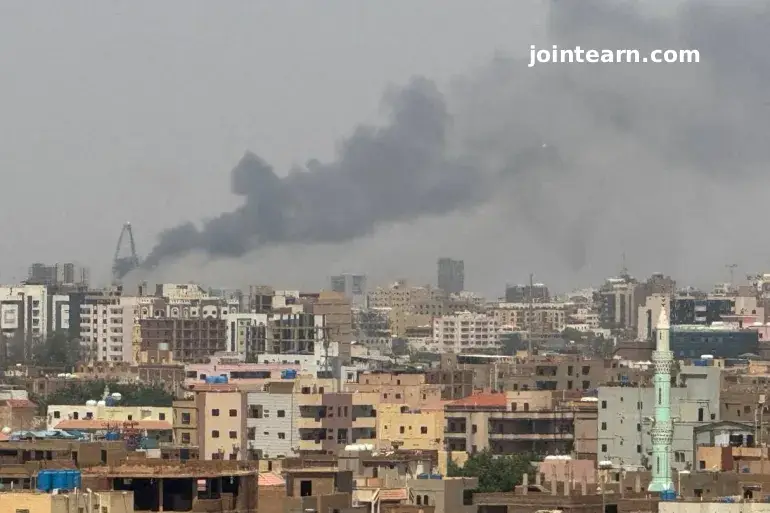
Sudan’s capital, Khartoum, experienced a series of drone attacks early Tuesday, hitting areas including the vicinity of Khartoum International Airport, just a day before its long-awaited reopening. Reports from AFP and local Sudanese media describe multiple explosions and plumes of smoke across the city, reigniting concerns about ongoing instability in the war-torn country.
Early-Morning Drone Strikes Near Khartoum Airport
Witnesses reported hearing drones flying over central and southern Khartoum between 4 a.m. and 6 a.m. (02:00–04:00 GMT). Several explosions were reported near the airport, which has been closed since April 2023 when fighting erupted between the Sudanese army and the paramilitary Rapid Support Forces (RSF).
Sudan’s Rakoba News cited witnesses describing more than eight blasts in and around the airport, claiming the use of “suicide drones”, and attributing the attack to RSF forces. Similarly, the Paris-based Sudan Tribune reported “plumes of smoke rising from within the airport perimeter”, corroborated by security sources.
A local security official noted that some of the drones were intercepted by the Sudanese military. Reports indicate that Omdurman, a city north of Khartoum hosting key military installations, was also targeted. At this time, no group has officially claimed responsibility, and details regarding casualties or infrastructure damage remain unclear.
Scheduled Airport Reopening at Risk
The attacks occurred just a day before Khartoum International Airport was scheduled to reopen after more than two years of closure. The airport suffered extensive damage during the 2023 conflict. The Sudan Civil Aviation Authority had announced that domestic flights would gradually resume following technical and operational preparations.
Although the army regained control of Khartoum earlier this year, intermittent drone strikes, primarily attributed to the RSF, continue to threaten both military and civilian infrastructure. Tuesday’s attacks mark the third wave of drone strikes in the capital within a week, highlighting ongoing security challenges.
Impact on Civilians and Reconstruction Efforts
Since the army’s counteroffensive and recapture of the capital, over 800,000 people have returned to Khartoum. Authorities have initiated reconstruction campaigns, relocating government officials back from Port Sudan, where they operated during the RSF occupation.
However, much of the city remains in ruins. Millions of residents continue to face frequent power outages, largely due to ongoing RSF drone activity. Meanwhile, the most intense clashes have shifted west, with RSF forces surrounding el-Fasher, the last major city in Darfur outside their control.
The paramilitary’s efforts to seize el-Fasher have raised UN warnings about potential “large-scale, ethnically driven attacks and atrocities.” If RSF gains full control of Darfur, it would dominate the western and southern regions of Sudan, while the army retains authority over the central, eastern, and northern areas.
Humanitarian Toll
The ongoing war in Sudan has caused a humanitarian catastrophe, with tens of thousands killed and nearly 12 million displaced, creating the world’s largest displacement and hunger crises. The renewed drone attacks near Khartoum International Airport highlight the persistent threats to civilian safety and the fragile path toward recovery.


Leave a Reply